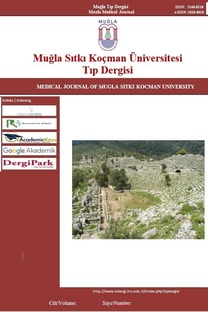Ketojenik Diyet ve Duygudurum Bozukluğu
Bipolar Bozukluk, Duygudurum Bozukluğu, Ketojenik Diyet, Ölçek
Ketogenic Diet and Mood Disorder
Bipolar Disorder, Mood Disorder, Ketogenic Diet, Questionnaire,
___
- 1. Höhn S, Dozières-Puyravel B, Auvin S. History of dietary treatment from Wilder's hypothesis to the first open studies in the 1920s. Epilepsy Behav. 2019;101:106588.
- 2. Peterman MG. The ketogenic diet in the treatment of epilepsy: A Preliminary Report. Am J Dis Child. 1924;28(1):28-33.
- 3. Wheless JW. History of the ketogenic diet. Epilepsia. 2008;49(8):3-5.
- 4. Mohorko N, Černelič-Bizjak M, Poklar-Vatovec T, et al. Weight loss, improved physical performance, cognitive function, eating behavior, and metabolic profile in a 12-week ketogenic diet in obese adults. Nutrition Res. 2019;62:64-77.
- 5. Kosinski C, Jornayvaz FR. Effects of ketogenic diets on cardiovascular risk factors: Evidence from animal and human studies. Nutrients. 2017;9(5):517.
- 6. Gasior M, Rogawski MA, Hartman AL. Neuroprotective and disease-modifying effects of the ketogenic diet. Behav Pharmacol. 2006;17(5-6):431-9.
- 7. Murphy P, Likhodii S, Nylen K, et al. The antidepressant properties of the ketogenic diet. Biol Psychiatry. 2004;56(12):981-3.
- 8. Merikangas KR, Akiskal HS, Angst J, et al. Lifetime and 12-month prevalence of bipolar spectrum disorder in the National Comorbidity Survey replication. Arch Gen Psychiatry. 2007;64(5):543-52.
- 9. Grande I, Berk M, Birmaher B, et al. Bipolar disorder. Lancet. 2016;387(10027):1561-72.
- 10. Kayhan F, Cıcek E, Uguz F, et al. Mood and anxiety disorders among inpatients of a university hospital in Turkey. Gen Hosp Psychiatry. 2013;35(4):417-22.
- 11. Uguz F, Yakut E, Aydogan S, et al. Prevalence of mood and anxiety disorders during pregnancy: A case-control study with a large sample size. Psychiatry Res. 2019;272:316-8.
- 12. Godart N, Radon L, Curt F, et al. Mood disorders in eating disorder patients: Prevalence and chronology of ONSET. J Affect Disord. 2015;185:115-22.
- 13. Brietzke E, Mansur RB, Subramaniapillai M, et al. Ketogenic diet as a metabolic therapy for mood disorders: Evidence and developments. Neurosci Biobehav Rev. 2018;94:11-6.
- 14. Lambrechts DA, Bovens MJ, de la Parra NM, et al. Ketogenic diet effects on cognition, mood, and psychosocial adjustment in children. Acta Neurol Scand. 2013;127(2):103-8. 15. Bostock ECS, Kirkby KC, Taylor BVM. The current status of the ketogenic diet in psychiatry. Front Psychiatry. 2017;8:43.
- 16. Rakofsky J, Rapaport M. Mood Disorders. Continuum: Lifelong Learning in Neurology. 2018;24(3):804-27.
- 17. Hirschfeld R, Williams J, Spitzer R, et al. Development and validation of a screening instrument for bipolar spectrum disorder: The mood disorder questionnaire. Am J Psychiatry. 2000;157:1873-5.
- 18. Konuk N, Kiran S, Tamam L, et al. Validation of the Turkish version of the mood disorder questionnaire for screening bipolar disorders. Turk Psikiyatri Derg. 2007;18(2):147-54.
- 19. Miller CJ, Klugman J, Berv DA, et al. Sensitivity and specificity of the Mood Disorder Questionnaire for detecting bipolar disorder. J Affect Disord. 2004;81(2):167-71.
- 20. Williams N. The Mood Disorder Questionnaire. Occup Med (Lond). 2017;67(2):165-6.
- 21. Clemente AS, Diniz BS, Nicolato R, et al. Bipolar disorder prevalence: a systematic review and meta-analysis of the literature. Braz J Psychiatry. 2015;37(2):155-61.
- 22. Moreira ALR, Van Meter A, Genzlinger J, et al. Review and meta-analysis of epidemiologic studies of adult bipolar disorder. J Clin Psychiatry. 2017;78(9):1259-69.
- 23. Joslyn C, Hawes DJ, Hunt C, et al. Is age of onset associated with severity, prognosis, and clinical features in bipolar disorder? A meta-analytic review. Bipolar Disord. 2016;18(5):389-403.
- 24. McClernon FJ, Yancy Jr WS, Eberstein JA, et al. The effects of a low-carbohydrate ketogenic diet and a low-fat diet on mood, hunger, and other self-reported symptoms. Obesity. 2007;15(1):182.
- 25. Phelps JR, Siemers SV, El-Mallakh RS. The ketogenic diet for type II bipolar disorder. Neurocase. 2013;19(5):423-6.
- 26. Iacovides S, Goble D, Paterson B, et al. Three consecutive weeks of nutritional ketosis has no effect on cognitive function, sleep, and mood compared with a high-carbohydrate, low-fat diet in healthy individuals: a randomized, crossover, controlled trial. Am J Clin Nutr. 2019;110(2):349-57.
- 27. Campbell IH, Campbell H. Ketosis and bipolar disorder: controlled analytic study of online reports. B J Psych Open. 2019;5(4):e58.
- 28. Brown AJ. Low-carb diets, fasting and euphoria: Is there a link between ketosis and γ-hydroxybutyrate (GHB)? Med Hypotheses. 2007;68(2):268-71.
- ISSN: 2148-8118
- Yayın Aralığı: Yılda 3 Sayı
- Başlangıç: 2014
- Yayıncı: Muğla Sıtkı Koçman Üniversitesi
Anıl GÜLCÜ, Serkan AYDIN, Ahmet ASLAN
Rukiye ÇİFTÇİ, FATMA KIZILAY, Şeyma TOY, Deniz ŞENOL, Betül AKYOL, Yüksel ERSOY, Davut ÖZBAĞ
Makine Öğrenmesi ile Radyolojik Görüntülerden Kemik Yaşı Tahmini
Nida GÖKÇE NARİN, Önder YENIÇERI, Gamze YÜKSEL
Trakya Bölgesindeki Doğumsal ve Gelişimsel Katarakt Olgularında Cerrahi Tedavi ve Prognoz
Göksu ALAÇAMLI, Haluk ESGİN, Vuslat GÜRLÜ, Nazan BENGÜDENİ, Ömer BENİAN, Levent ALİMGİL, Sait ERDA
Coronary Artery Fistulas in Adults: Evaluation with Coronary CT Angiography
Sporcularda Kronik Dental Lezyonların Kas Kuvvetine Etkisi
Tuğba KOCAHAN, Osman HAMAMCILAR, Aydın BALCI, BİHTER AKINOĞLU, Nevres Hürriyet AYDOĞAN, Adnan HASANOĞLU
Vulvanın Paget Hastalığı: Olgu Sunumu
Ayhan ATIGAN, Soner GÖK, Yeliz ARMAN KARAKAYA
Yetişkinlerde Koroner Arter Fistülleri: Koroner BT Anjiyografi ile Değerlendirme
Nevres Hürriyet AYDOĞAN, Cem Yalın KILINÇ, Emre GÜLTAÇ, Fatih İlker CAN, Hıdır TANYILDIZI, Ahmet Emrah AÇAN
Mikro Akışkan Sperm Ayıklama Chip Yöntemi ile İntraUterinİnseminasyon: Olgu Sunumu
